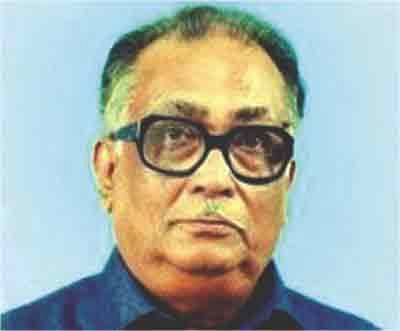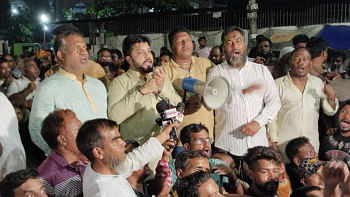Land of magic

The writer
This write-up is the first of a two-part article Star Literature means to carry for its readers. It first appeared in 'East Pakistan Review: An Anthology', published in Karachi in 1958.
----Literary Editor
In ten years' stay in Karachi, I had never been allowed to forget for long the current myths about our home province East Pakistan --- now Bangladesh. They ranged from weird suggestions of Black Magic to banal hints about man-eaters and pythons in Dhaka. My sweeper woman, for example, after much hemming and hawing, once ventured the remark that like all 'Bengali Babus' I too must be a great jadugar, a magician. Her eyes bristling with anger at some errant Romeo, she entreated me, "Teach me, please, to turn at least one man into a pig". It was a sticky moment, but I got over that one by saying, with appropriate gravity, "The secret cannot be theirs who know not how to put away mundane things and worldly emotions such as greed, anger, etc., etc."
Then there were those of our middle class friends, mostly displaced from Northern India, who harkened back most nostalgically to the little Kaminis and Draupadis in their primary classrooms and talk of the magic in their coal-black eyes and dark tresses. To them Black Magic was the property of Bengali women. But this was nothing unusual, for the same refrain is found in the songs sung by women in Bangladesh. The belles of Chittagong complain of the snares Burmese women spread with their intricate coiffure for the unwary 'Naujawans of Chatiga' (local name for Chittagong). On a winter's night, when the flickering lights from the oil lamps weave a dream-tracery on the sluggish waters of the Old Brahmaputra, the chant of the women can be heard from a boat convoy ---
"Oh, tell me, priceless sister-in-law,
Why do our men marry?"
After recounting their heartless desertion of hearth and home for a living across the Garo Hills, the complaint beats like the ceaseless downpour in the foothills:
"For Assam runs the sea".
Here not only the wiles of crafty Assamese women are blamed, but with an unusual sense of reality, the entire land appears as a brooding monster swallowing up men of the Mymensingh belt. To clinch matters, young men also threaten in their songs that if brides are not found for them they will leave home and go away to distant Assam and Rangoon.
Having brushed aside all such misconceptions, some of them touchingly flattering to our 'Land of Magic', we are left with one which we cannot honestly disown. That Bangladesh is a land of music lovers.
One finds hard put to it to find a single person, however rude and unlettered, who does not react to some form of music or other. The rolling rivers, the gathering clouds, the swaying forests, the undulating rice in the fields, the mist-laden mornings and the perfume-drunk dusk, all keep time to an enveloping overwhelming orchestra of grand music, a tumultuous chorus of man, nature and beast.
Every occasion and event, whether it be floods, famine, the Bhawal Sannyasi Impersonation Case or the general elections, gives birth to a host of songs set to age-old tunes.
In Faridpur, I heard a ten-year old boy sing a United Front ballad in the folksy heroic style of the song cycles about Sohrab-Rustam or the Karbala heroes. In this particular case, the local pahelwan was Mohan Mia (the local United Front candidate).
"Whom shall I tell my tale of woe? The mighty hordes have fallen in battle and none to bury them. The world conqueror Mohan Mia, the militant hero, is swinging his adversary, Abdul Ali Moulana, over his head." It is just an adaptation of the events which the popular imagination associates with the exploits of ancient heroes.
Whatever is big in effect extracts a tribute from the songwriter. Even the mosquitoes of Dhaka city with their redoubtable sting gave rise to songs about five decades back and were printed in the local broadsheet Chabuk (The Whip).
There is a class in Dhaka city, justly famous for their musical sense --- the band of little urchins--- who under the hawk eyes of a fiddle-wielding mason, beat the housetops into shape and break the monotony of the livelong day with their singsong chant. Mostly they are ribald, amorous songs, but one that I remember complained to the master of the erratic behaviour of his clock, which races to 10 a.m. so soon, but lingers on and never seems to announce 5 p.m., which is knocking off time. It voiced the suspicion that the employer had pulled a fast one on them by winding the clock the wrong way round.
I have purposely chosen these low brow examples to emphasise the fundamentally democratic content of our musical tradition. The close proximity of our songs to the day-to-day life of the peasant and labourer is at once the source of our strength and our weakness, our distinctive trait which marks us off from the Calcutta tradition (which again is distinct from the robust folk tradition of West Bengal's countryside). It has given birth to a thousand lyrics and ballads which may be too strong for the delicate stomach of polite society. Yet for the same reason it rises to the sublime heights of simple profundity in Lalan Fakir. Madan Fakir is comparable to the best of Shah Abdul Latif Bhitshahi.
Rabindranath Tagore quoted Shaikh Madan Fakir in his presidential address before the All-India Philosophical Congress ---
"My restless heart, you would make flowers bloom, release the perfume in reckless hurry. See how my great Preceptor has through the ages unhurriedly made the buds come to life."
Lalan Fakir has it thus ---
"Next to my house is the City of Mirrors. There lives one of my neighbours, but, woe is me! For I have never been able to catch a glimpse of him."
In the Comilla countryside, mendicants sing lyrics of Mathachhila Fakir (the bald-headed or shaven-headed Fakir).
"Hearken, my heart of stone. I do not know the meaning of dedicated devotion. For I came to weed out the field and instead of the weed I reaped the unripe rice. The wise ask me, 'What have you done, fool? Can you now live on grass instead of rice? Can the hilsa (palla fish) live in a stagnant pool? Can you ripen the jackfruit with blows? And whoever heard of the honeybee hiving in the hornet's nest?'"
The same bard sings of the human body as a tent strung on arteries and veins and covered with a canopy of skin and talks of the thief that enters this fine tabernacle to steal the richest gem.
"In the betel nut grove comes the noiseless bat and in the darkness of the night steals away with the fruit."
Pagla (mad) Kanai talks of man as a queer boat fashioned by its Creator that sails not on the waters but travels on land propelled by two oars and manned by the six senses, who on the day of the Deluge will abandon the vessel, leaving it to founder on the highland. He invokes the boatman not to let go of the rudder in that moment of crisis and to fight the furies so that the boat does not completely go under.
So it goes on, running through much of the folk songs, ranging from the Murshidi to the Bhatiali, the same strain of mystic longing, spiritual questionings, the madness that longs to know and be one with the unidentifiable. It has been said with much truth that the average Bengali villager, because of his innate bent of mind, the setting in which he is born and lives, always demands some spiritual fare even in the most worldly and prosaic things. No song is deemed of a high order if it does not contain suggestions of the larger world that lies beyond our ken. It is as if the untutored millions, pondering on the dark mysteries that surround them, and watching the mighty moods of a capricious culture have rediscovered the meaning of their origin and final destiny.
"But trailing clouds of glory do we come from God, who is our home . . ." Because of the proximity of this world to the other larger universe, of which this earth is only a visible part, the songs and music of the bard and the lyricist show a queer symbolism, the words throb with multiple shades of meaning. The images quarried from day to day habits and happenings become the vehicle of the most abstruse philosophy worked out through individual meditation. Not always are the ways of God justifiable to these Fakirs and hence they are known often as Beshara fakirs. The teachings of the Holy Book may or may not corroborate their individual findings, but the stress is on the individual quest for and realization of Truth. (Will continue next week).

 For all latest news, follow The Daily Star's Google News channel.
For all latest news, follow The Daily Star's Google News channel. 



Comments